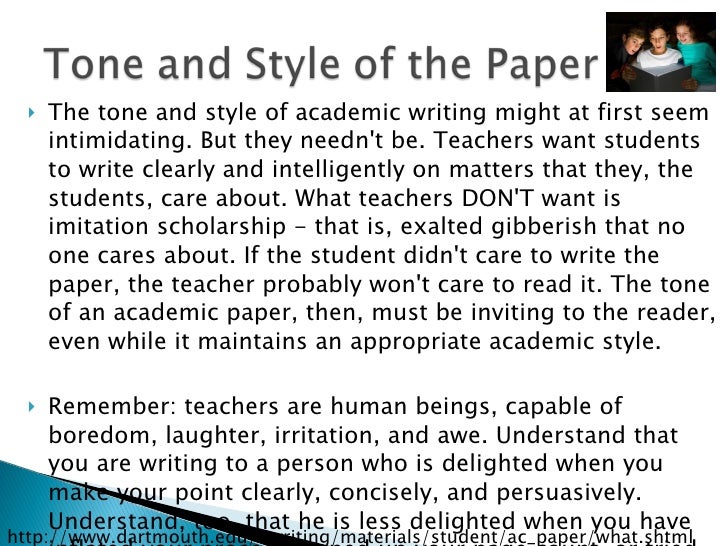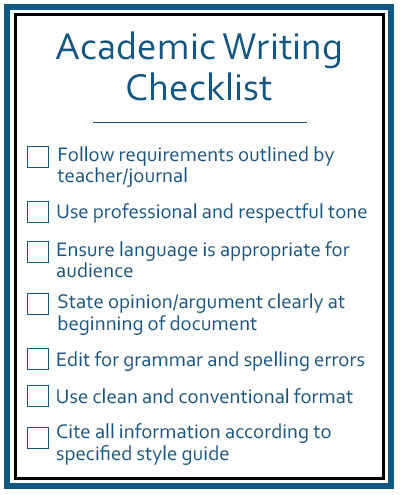
Feb 21, · Do not use personal pronouns in your academic writing (e.g.I, my, me, mine). It creates an informal tone and makes your writing sound subjective, as opposed to objective. Third person pronouns are permissible, however. Other devices to avoid include: Hyperbole Imprecisions Intimate usage Unnecessary passive voice Combinative verbs Vulgarisms Click here for more advice on aspects to avoid in academic writing. Academic writing Estimated Reading Time: 6 mins Apr 12, · Academic writing is clear, concise, focussed, structured and backed up by evidence. Its purpose is to aid the reader’s understanding. It has a formal tone and style, but it is not complex and does not require the use of long sentences and complicated vocabulary Tone and Style Tone and style, while often confused, are both important in academic writing. Style also involves word choice, coherence, conciseness, and correctness. This chapter contains sections about each of these elements of style. Definition of Tone and Style. Tone refers to the type of language a writer uses to address their audience. When writing an email to a friend, for example, you may choose to use an informal or colloquial tone, Author: Carellin Brooks
What is the tone of academic writing? – blogger.com
Most university writing tasks require you to draw on a range of academic sources to support your claims, arguments and ideas. We use the term academic voice to talk about distinguishing between your thoughts and words, and those of other authors. capable of being believed; believable: a credible statement.
worthy of belief or confidence; trustworthy: a credible witness. A balanced sentence is made up of two segments which are equal, not only in length, but also in grammatical structure and meaning.
It could be a periodic or cumulative sentence. Since balanced sentences always have parallelism, writers need to use parallelism with academic writing and tone grammatical forms, structure, and word order, academic writing and tone.
Academic writing is clear, concise, academic writing and tone, focussed, structured and backed up by evidence. It has a formal tone and style, but it is not complex and does not require the use of long sentences and complicated vocabulary. Characteristics of academic writing include a formal tone, use of the third-person rather than first-person perspective usuallya clear focus on the research problem under investigation, and precise word choice.
Papers written in an academic style have at least least three distinct sections: the introduction, body and conclusion. Skip to content What is the tone of academic writing? What is voice in academic writing? What is a balanced and credible voice? What is the meaning of credible? What does balance mean in writing?
What are the characteristic of academic writing? What is the first characteristic of academic writing? What are the three distinct sections of academic writing?
The Tone of Academic Writing
, time: 6:11Tone and Style – Building Blocks of Academic Writing

Apr 12, · Academic writing is clear, concise, focussed, structured and backed up by evidence. Its purpose is to aid the reader’s understanding. It has a formal tone and style, but it is not complex and does not require the use of long sentences and complicated vocabulary Tone and Style Tone and style, while often confused, are both important in academic writing. Style also involves word choice, coherence, conciseness, and correctness. This chapter contains sections about each of these elements of style. Definition of Tone and Style. Tone refers to the type of language a writer uses to address their audience. When writing an email to a friend, for example, you may choose to use an informal or colloquial tone, Author: Carellin Brooks Jun 01, · Academic writing should be objective. The language of academic writing should therefore be impersonal, and should not include personal pronouns, emotional language or informal speech. Use of personal pronouns (I / my / our / us / etc) can make the tone of writing too subjective, and should be avoided
No comments:
Post a Comment